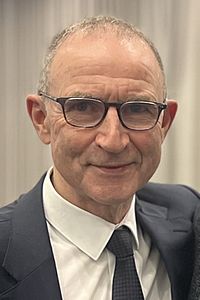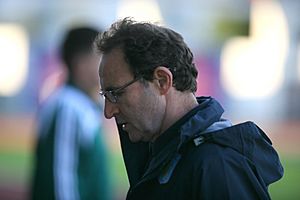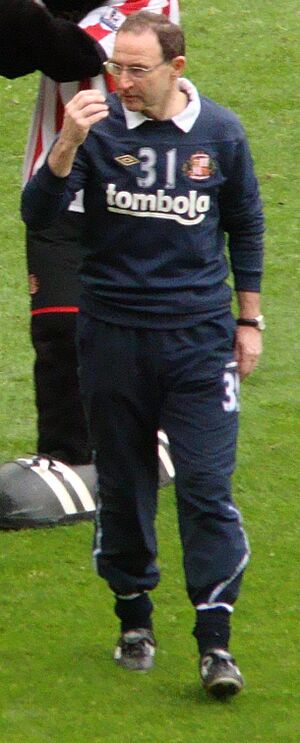Martin O'Neill facts for kids

O'Neill in 2023
|
|||
| Personal information | |||
|---|---|---|---|
| Full name | Martin Hugh Michael O'Neill | ||
| Date of birth | 1 March 1952 | ||
| Place of birth | Kilrea, Northern Ireland | ||
| Height | 5 ft 10 in (1.78 m) | ||
| Position(s) | Midfielder | ||
| Youth career | |||
| Rosario | |||
| 1969–1971 | Derry City | ||
| Senior career* | |||
| Years | Team | Apps | (Gls) |
| 1971 | Distillery | 7 | (3) |
| 1971–1981 | Nottingham Forest | 285 | (48) |
| 1981 | Norwich City | 11 | (1) |
| 1981–1982 | Manchester City | 13 | (0) |
| 1982–1983 | Norwich City | 55 | (11) |
| 1983–1984 | Notts County | 64 | (5) |
| 1984 | Chesterfield | 0 | (0) |
| 1985 | Fulham | 0 | (0) |
| Total | 435 | (68) | |
| International career | |||
| 1971–1984 | Northern Ireland | 64 | (8) |
| Managerial career | |||
| 1987–1989 | Grantham Town | ||
| 1989 | Shepshed Charterhouse | ||
| 1990–1995 | Wycombe Wanderers | ||
| 1995 | Norwich City | ||
| 1995–2000 | Leicester City | ||
| 2000–2005 | Celtic | ||
| 2006–2010 | Aston Villa | ||
| 2011–2013 | Sunderland | ||
| 2013–2018 | Republic of Ireland | ||
| 2019 | Nottingham Forest | ||
| *Club domestic league appearances and goals | |||
Martin O'Neill (born 1 March 1952) is a famous Northern Irish football manager and former player. He played as a midfielder. Martin O'Neill spent most of his playing career with Nottingham Forest. He helped them win the First Division title in 1977–78. He also won the European Cup twice, in 1979 and 1980. He played 64 times for the Northern Ireland national football team. He was also the captain of the team at the 1982 World Cup.
As a manager, O'Neill has led many clubs. These include Leicester City, Celtic, and Aston Villa. He guided Leicester City to win the Football League Cup twice. As Celtic manager, he won seven trophies, including three Scottish Premier League titles. He also led Celtic to the 2003 UEFA Cup Final. He later managed the Republic of Ireland national football team. He helped them qualify for the 2016 UEFA European Championship.
Contents
Early Life and Gaelic Football
Martin O'Neill was born in Kilrea, Northern Ireland, in 1952. He was one of nine children. His father helped start the local GAA club. This is a sports organization for traditional Irish games. His brothers also played for the Derry senior team. They won the 1958 Ulster Senior Football Championship. Martin also played Gaelic football when he was younger.
He played for a local football team called Rosario. Then he played for Distillery. At that time, GAA rules did not allow Gaelic footballers to play other sports. When his school team reached a big final, the game had to be moved. This was so Martin could play.
Playing Career Highlights
Starting Out in Football
Before joining Distillery, O'Neill played for Rosario. At Distillery, he won the Irish Cup in 1971. He scored two goals in the final. One of his goals was very impressive. He dribbled past three players before scoring. Because they won the cup, Distillery played in a European competition. O'Neill even scored against Barcelona in a European match. A scout from Nottingham Forest noticed him. He signed with the English club in October 1971. He left his law studies at the University of Belfast to play football.
Success with Nottingham Forest
O'Neill became a key player during Nottingham Forest's best years. He scored in his first league game for the club. This was a 4–1 win against West Bromwich Albion. Forest was relegated in 1972. But then Brian Clough became manager in 1975. This changed everything for the club.
Under Clough, O'Neill helped Forest get promoted in 1977. They then won the league title and League Cup in 1978. They won the League Cup again in 1979. He was a substitute for Forest's first European Cup win in 1979. He played in their second European Cup win in 1980.
Later Playing Years
O'Neill joined Norwich City in 1981. Norwich was relegated that season. He then moved to Manchester City. He later returned to Norwich in 1982. He helped them get promoted again. After another season at Norwich, he played for Notts County. He tried to make a comeback with Chesterfield in 1984. But a knee injury stopped him. He retired from playing in February 1985 because of his injury.
International Football for Northern Ireland
O'Neill first played for Northern Ireland in 1971. He became a regular player for the Northern Ireland national football team. He was the captain at the 1982 World Cup in Spain. His team reached the second group stage. They even beat the host nation, Spain. He played 64 times for Northern Ireland and scored eight goals. He also won the British Home Championship twice as a player.
Managerial Career Journey
After his playing career, O'Neill started managing football teams. He first managed Grantham Town in 1987.
Leading Wycombe Wanderers
He became manager of Wycombe Wanderers in February 1990. He led Wycombe to the Football League for the first time ever. This was in the 1992–93 season. In the next season, they got promoted again to Division 2. O'Neill also won the FA Trophy with Wycombe in 1991 and 1993. He left the club in June 1995 to manage Norwich City.
Time at Norwich City
O'Neill managed Norwich City from June to December 1995. He left because he disagreed with the club chairman.
Success with Leicester City
O'Neill joined Leicester City right after leaving Norwich. In his first season, Leicester was promoted to the Premier League. He led them to win the Football League Cup in 1997 and 2000. They also reached the final in 1999. Leicester finished high in the Premier League under him. Their League Cup wins meant they qualified for the UEFA Cup.
Celtic's Golden Era
O'Neill became manager of Celtic in June 2000. In his first game against rivals Rangers, Celtic won 6–2. This was their biggest win over Rangers since 1957. In that first season, O'Neill won three trophies with Celtic. This was the first time they had done this since 1969. Celtic then won the league title again in 2001–02. They also played in the UEFA Champions League group stage.
He led Celtic to the 2003 UEFA Cup Final in Seville. They lost 3–2 to Porto in extra time. This was Celtic's first European final since 1970. The next season, Celtic won the league title again. They also reached the quarter-finals of the UEFA Cup.
On 25 May 2005, O'Neill announced he would leave Celtic. He wanted to care for his wife, Geraldine, who was ill. His last game was a Scottish Cup final win on 28 May 2005. Under O'Neill, Celtic won 213 out of 282 games. This made him one of Celtic's most successful managers. He won three Scottish Premier League titles, three Scottish Cups, and one League Cup.
Managing Aston Villa
O'Neill became the Aston Villa manager on 4 August 2006. He wanted to help the club return to its past glory. Villa had a great start in the 2006–07 season. They went 9 games without a league defeat. O'Neill was named Premier League Manager of the Month for April. Villa finished 11th, much better than the previous season.
In the 2007–08 season, Aston Villa just missed out on a UEFA Cup spot. They finished sixth and qualified for the Intertoto Cup. They scored 71 goals, their best tally since 1981.
In the 2008–09 season, Villa was third in the league after 25 games. They were aiming for a spot in the Champions League. However, they then had a tough run of games and missed out on the top four.
In the 2009–10 season, Villa reached their first final under O'Neill. This was the League Cup final in February 2010. They lost 2–1 to Manchester United. Villa finished sixth in the league for the third season in a row.
On 9 August 2010, O'Neill resigned as Aston Villa manager. He said he enjoyed his time there. Reports suggested he was unhappy about money for new players.
Time at Sunderland
On 3 December 2011, O'Neill signed a contract with Sunderland. This was the team he supported as a boy. In his first game, Sunderland won 2–1. Under O'Neill, Sunderland improved a lot. They won four of his first six games, including one against Manchester City. Sunderland continued to play well and moved up the league table. They reached the FA Cup fifth round.
In the next season, Sunderland's form declined. They slipped into the relegation zone. O'Neill was dismissed by Sunderland on 30 March 2013. This happened after a 1–0 defeat by Manchester United. The team was one point above the relegation zone.
Managing Republic of Ireland
O'Neill became the new manager of the Republic of Ireland national football team on 5 November 2013. His former team captain, Roy Keane, joined him as assistant. His first game was a 3–0 win against Latvia.
On 16 November 2015, the Republic of Ireland qualified for UEFA Euro 2016. They beat Bosnia and Herzegovina in the play-offs.
In March 2016, O'Neill made comments about people's appearances that were criticized. He later made comments that were seen as offensive to the LGBT community. He apologized for these remarks.
On 7 June 2016, O'Neill signed a new contract. On 22 June 2016, Ireland beat Italy 1–0 in Euro 2016. This meant they qualified for the knockout stages.
On 9 October 2017, Ireland beat Wales to qualify for the World Cup play-offs. They drew 0–0 against Denmark in the first leg. But they lost 5–1 in the second leg. In January 2018, O'Neill signed another two-year contract.
On 21 November 2018, O'Neill left his role with the FAI.
Return to Nottingham Forest
On 15 January 2019, O'Neill became the manager of Nottingham Forest. He led the club to a ninth-place finish. However, he was sacked on 28 June 2019. This happened soon after his assistant, Roy Keane, left the club.
Life Outside Football
Martin O'Neill never finished his law degree. But he is still interested in criminology. He has also worked as a football analyst on TV for the BBC and ITV. He covered the World Cup, European Championship, and UEFA Champions League matches.
He received an award called the OBE in 2004 for his services to football. In 2002, Norwich fans voted him into the club's Hall of Fame. In November 2013, he received the Nottingham Lifetime Achievement Award. This was for his achievements with Nottingham Forest.
In November 2022, O'Neill's book, On Days Like These: The Incredible Autobiography of a Football Legend, was published. In June 2024, O'Neill started co-hosting a podcast called The Football Authorities. He hosts it with his friend Clive Tyldesley. The podcast talks about major football stories and answers listener questions.
Personal Life
Martin O'Neill and his wife Geraldine have two daughters. When he was young, O'Neill supported Sunderland and Celtic. His favorite player was Sunderland captain Charlie Hurley.
Honours and Awards
As a Player
Distillery
- Irish Cup: 1970–71
Nottingham Forest
- First Division: 1977–78
- League Cup: 1977–78, 1978–79
- European Cup: 1978–79, 1979–80
- FA Charity Shield: 1978
- European Super Cup: 1979
- Anglo-Scottish Cup: 1976–77
Northern Ireland
- British Home Championship: 1979–80, 1983–84
As a Manager
Wycombe Wanderers
- Football League Third Division play-offs: 1994
- Football Conference: 1992–93
- FA Trophy: 1990–91, 1992–93
- Conference League Cup: 1991–92
Leicester City
- Football League First Division play-offs: 1996
- Football League Cup: 1996–97, 1999–2000; runner-up: 1998–99
Celtic
- Scottish Premier League: 2000–01, 2001–02, 2003–04
- Scottish Cup: 2000–01, 2003–04, 2004–05
- Scottish League Cup: 2000–01
- UEFA Cup runner-up: 2002–03
Aston Villa
- Football League Cup runner-up: 2009–10
Individual Awards
- Premier League Manager of the Month: September 1997, October 1998, November 1999, April 2007, November 2007, December 2008, April 2010, December 2011
- Scottish Premier League Manager of the Month: August 2000, December 2000, February 2001, August 2001, April 2002, November 2002, October 2003, November 2003, January 2005
- LMA Football League Third Division Manager of Year: 1993–94
- LMA Football League First Division Manager of Year: 1995–96
- SFWA Manager of the Year: 2000–01, 2001–02, 2003–04
- Scottish Premier League Manager of the Year: 2003–04
See also
 In Spanish: Martin O'Neill para niños
In Spanish: Martin O'Neill para niños
 | Audre Lorde |
 | John Berry Meachum |
 | Ferdinand Lee Barnett |



